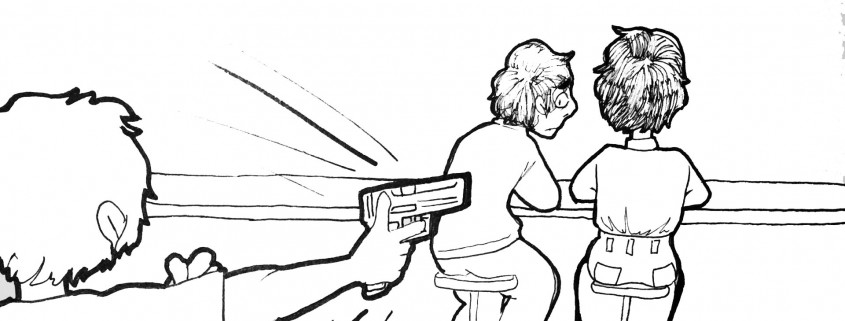After Kansas shooting, Indian Americans launched into identity crisis
“Do we belong here?”
That is the chilling question that Sunayana Dumala, the widow of Indian immigrant Srinivas Kuchibhotla, posed on Facebook after her husband was murdered at a bar in Kansas. The shooter, Adam Purinton, yelled “terrorist” and “get out of my country,” according to witnesses, after questioning the immigration status of Kuchibhotla and his friend, Alok Madasani, who was wounded when Purinton opened fire.
The layers of ignorance are almost comical. That Purinton conflated anyone’s heritage with their ability to be a “terrorist” deeply contradicts modern realities of terrorism. But that Purinton also conflated the immigrants’ Indian heritage with, to borrow a phrase from President Donald Trump, “radical Islamic terrorism” is also absurdly inaccurate, seeing as Hindu-dominant India has been in conflict with nearby Muslim-dominant countries for centuries. But, it turns out, Purinton hadn’t even realized the two men were Indian at all; a 911 call placed by a bartender at Applebee’s, where Purinton confessed to his crime, revealed that Purinton had thought he had shot two “Iranian” people.
Purinton’s narrative is clear: All brown people — Iranians, Indians, Muslims and others — are the same. They are all terrorists. And, according to Purinton, their identities should cost them their lives.
The attack has shaken the Indian community, and the Indian American community, to its core. Even as some white Americans have grown paranoid of Islam in recent years, Indian Americans have always taken solace in the idea that if they kept their heads down, they would be OK. But not anymore.
Scores of editorials in Indian newspapers urged the Trump administration to break its silence on the issue by condemning the attack and the rise of racial hatred in the United States. And Sarah Sanders, a White House spokesperson, did condemn the attack on Tuesday. The FBI is also investigating the incident as a hate crime.
“As more facts come to light and it begins to look like this was an act of racially motivated hatred,” Sanders said in a statement. “I want to reiterate the President condemns these or any other racially or religiously motivated attacks in the strongest terms. They have no place in our country.”
Even though Trump has said nothing, it is certainly telling that the White House — notorious for doubling down in the face of controversy — condemned this attack when it has been so unwilling to condemn other racially motivated attacks. Those words do not go unnoticed.
And yet they ring so hollow.
At his first speech to Congress last night, Trump invited the families of people who have been killed by undocumented immigrants. In a vicious attack, Sen. Bernie Sanders criticized the decision on Facebook.
“[L]et’s be clear about what Donald Trump is doing tonight in inviting family members who saw a loved one murdered by an undocumented immigrant. He is stirring up fear and hatred against immigrants and trying to divide our nation,” Sanders said. “Why didn’t Trump invite the family of Srinvas [sic] Kuchibhotla, the immigrant from India, who was recently shot down in cold blood by a white, native born American? Didn’t his life count?”
Even though Trump can pay lip service by sending a spokesperson to “condemn” racial attacks, he has not taken responsibility for his part in creating them. According to the Southern Poverty Law Center, Trump’s “incendiary rhetoric” is directly responsible for the near-tripling of hate groups over the past year. Additionally, according to Bloomberg, the New York Police Department reported a spike in hate crimes between election day last year and Feb. 19. It is clear that a rise in hate crimes are a clear consequence of the Trump administration’s rhetoric and policies emboldening racists, white supremacists and neo-Nazis to forward a nationalist agenda that comes at the expense of people of nearly all other ethnicities.
That is not the America that Indian immigrants — from Google CEOs to Nobel Prize recipients to people just trying to make a better life for their families — look up to. That is not the America that Indian immigrants — who make up 70 percent of H1-B visas, and so many of whom are accepted to enter the United States because of their expertise in the technology sector — raise their children to look up to. And it is certainly not the idea of the American Dream that Indian immigrants — many of whom come from humble beginnings and live their lives by the mantra of hard work and scholarship — have been sold.
Indian Americans now face an identity crisis guided by fears for their safety. It draws too many parallels to those of their Muslim, black and brown brothers and sisters.
So now, Indian Americans — a minority group that is often silent in political activism — must join the resistance against racial and religious hatred. The tragic loss of Kuchibhotla demonstrates that when xenophobia and racism are perpetuated against one group, ignorance is all-pervasive, and it carries fatal consequences. The only winners are white supremacists.


What, specifically, has President Trump said that is racist?